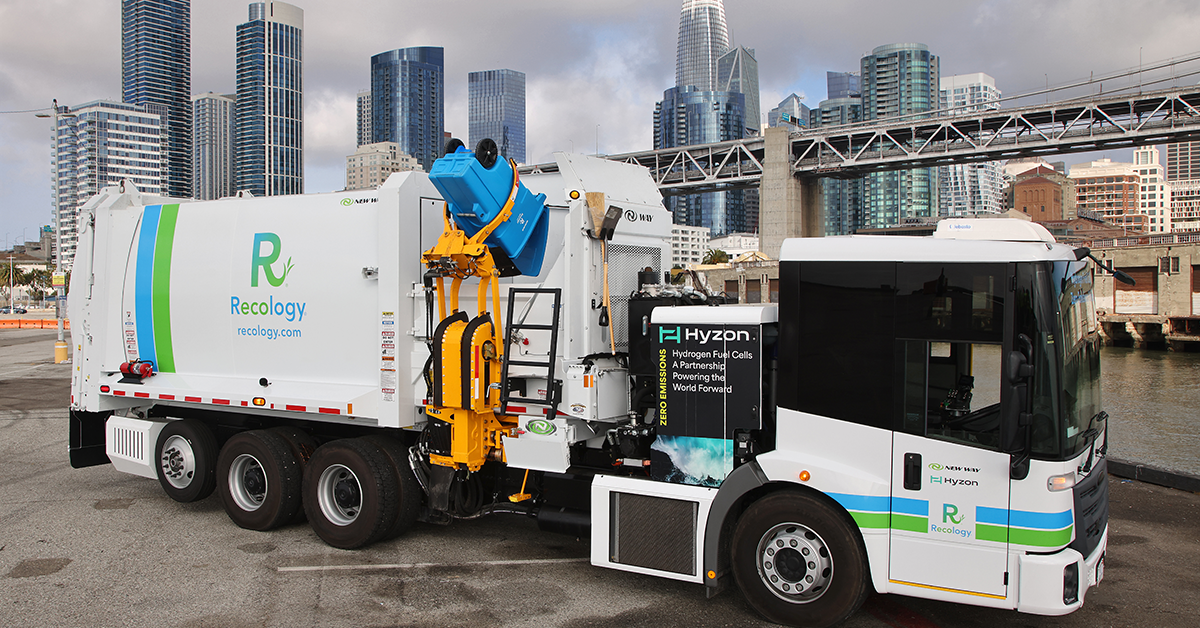Municipalities
Communities are paving the way for a greener future by transitioning their municipal fleets to zero-emission.

From refuse trucks and street sweepers to light-duty service vehicles, municipal fleets play a vital role in keeping communities running—and they’re uniquely positioned to lead the transition to zero-emission technology.
CTE partners with municipalities of all sizes to plan, fund, and deploy zero-emission vehicles and the infrastructure that powers them. Our team provides technical expertise, grant strategy, and project management to help local governments meet their climate goals, reduce operating costs, and improve air quality for residents.


Smart Deployment Services
CTE can help municipal fleets execute a smart deployment beginning in the planning phase. From assessing fleet needs to identifying key operational constraints, CTE’s expertise ensures that municipalities are able to make informed, data-driven decisions. A well-executed deployment plan minimizes disruptions, optimizes fleet performance, and aligns with long-term sustainability goals.
CTE’s modeling suite uses our proprietary engineering and analysis tools to develop an independent operational analysis that helps the fleet owner match ZEV technologies to service requirements.
Vehicle & Route Modeling – CTE gathers data on routes, technical specifications of the vehicle and charging or refueling equipment, and operational assumptions. This route and vehicle information is used to model the vehicles’ duty cycles, simulating vehicle performance on selected routes. The process also ensures that adequate power and energy storage specifications are met and inform fueling and charging strategies.
Fueling Infrastructure Modeling – For battery electric vehicle deployments, CTE defines charging scenarios to model electricity consumption and assess charging equipment requirements. Modeling results for electricity inform infrastructure procurement and operational decisions. For fuel cell electric vehicle deployments, CTE will determine daily hydrogen consumption and station throughput requirements given the fleet owner’s refueling window. CTE will also estimate a station scale-up plan as a starting point for fueling station design discussions.
Fuel Cost Modeling – CTE examines electric utility rate structures to estimate the annual cost of energy to charge battery electric vehicles. CTE works with the fleet owner and local utility providers to determine rate schedules that would be the most advantageous for supporting battery electric vehicle deployments. For fuel cell electric vehicle deployments, CTE will identify likely sources of hydrogen supply, evaluate hydrogen supply reliability, and estimate the cost of hydrogen.
Municipal fleets require reliable charging and fueling infrastructure to support daily operations. CTE models charger placement, quantity, type, and power requirements, while also identifying utility upgrades and grid constraints to optimize costs and efficiency.
Transitioning to a zero-emission fleet involves new fuel cost considerations. CTE provides detailed fuel cost modeling to project long-term operational expenses for electricity and hydrogen. This includes evaluating electricity demand charges, time-of-use pricing, hydrogen production costs, and infrastructure investments to help municipalities develop sustainable and cost-effective fueling strategies.
Municipal fleets must procure vehicles and fueling equipment that align with their operational needs while maintaining flexibility for future expansion. CTE assists decision-makers in developing technical specifications for vehicles, charging infrastructure, and hydrogen fueling stations to support competitive procurement. This ensures that vehicles are properly equipped with the right battery or fuel cell capacity, and that charging stations, hydrogen dispensers, and other infrastructure components are compatible, reliable, and cost-effective.
CTE employs a project management methodology specifically designed for zero-emission vehicle deployments and augmented by established project management, administration, reporting, and controls processes. CTE provides technical advisory services throughout the project to ensure that fleet owner staff understand the differences in technology and the best practices for deploying and operating ZEVs. CTE’s Smart Deployment Methodology is designed to address all aspects of a successful implementation including planning, requirements analysis, specifications, workforce development requirements, operator and maintenance training, testing and validation, and performance evaluation.
From identifying the right opportunity to managing post-award requirements, CTE provides full-service grant support tailored to your needs. Our team combines policy insight with deep technical expertise to develop competitive applications that align with funding priorities. We de-risk projects through data-driven strategies for technology selection, deployment modeling, procurement planning, and validation—positioning your project for long-term success.
Transition Planning Services
Municipal fleets include a wide variety of vehicles, from fire trucks and street sweepers to off-road and construction vehicles. CTE maintains a comprehensive database of the evolving zero-emission vehicle (ZEV) options across all vehicle types and technologies. Our database includes key details like battery capacity and range to help you identify viable ZEV options for your fleet.
To determine the range capability your fleet needs, CTE conducts a service assessment on duty cycles for all vehicles in the fleet. If available, CTE will leverage your existing telematics platform to determine each vehicle’s use conditions, including factors such as specific routes and schedules or emergency use needs. These insights provide evidence to establish how available ZEVs will fit into your fleet while minimizing operational disruptions.
Suitability vs. Feasibility
Not all ZEVs will meet the needs of your fleet. CTE evaluates both:
Feasibility: Can a ZEV handle daily operations, including range, energy needs, and auxiliary functions (e.g., heating, lifts, or emergency response)?
Suitability: Are ZEV models available that can meet fleet requirements with proven reliability and reasonable costs? CTE assigns a Suitability Score to each vehicle type based on availability, reliability, safety, and cost—ensuring only practical recommendations.
CTE can help you navigate the evolving regulatory landscape, including potential exemptions, to comply with applicable regulations, including CARB’s Advanced Clean Fleets regulation for government fleets.
CTE creates a replacement schedule for your existing internal combustion engine (ICE) vehicles with ZEVs based on four primary factors:
• Asset Replacement Schedule: Is the vehicle ready for replacement based on age, mileage, or hours?
• Duty Cycle Feasibility: Can the replacement ZEV feasibly meet the daily duty cycle?
• Vehicle Availability and Suitability: is the ZEV commercially available and is it a suitable replacement?
• Transition Goals: What strategies allow the fleet to meet its transition goals and timeframe while complying with regulations?
CTE estimates your fleet’s future fuel and energy needs and determines the required charging or refueling infrastructure to support ZEVs. This includes:
• Identifying the number and type of chargers or hydrogen stations needed
• Evaluating space, cost, and operational constraints
• Forecasting electricity or hydrogen costs and potential savings
CTE also models charge management strategies to help reduce utility costs.
Quantifying the emissions reduction benefits is an important tool to build support for your decarbonization plan. CTE can model the emissions savings for different transition pathways to support decision-making.
Beyond identifying the charging or refueling equipment needed, CTE provides implementation phase recommendations and analyzes the existing utility service capacity to determine if upgrades are needed. CTE can support discussions with your utility based on the forecasted future needs of the fleet and provide guidance on facility upgrades, timelines, and costs, including the safety upgrades required for maintaining hydrogen fleets.
Since internal combustion engines (ICE) and zero-emission vehicles have different maintenance requirements, they generally have different maintenance costs associated with them. CTE examines each technology’s related and analogous maintenance costs per mile or per hour as reported from real-world deployments to apply to the vehicle usage and estimate expected changes to vehicle maintenance costs as the fleet transitions.
For a resilient ZEV fleet, reliable backup power is essential. CTE conducts high-level assessments to identify the best infrastructure solutions for maintaining operations during emergencies and reducing strain on the grid. This includes evaluating backup generators, solar power, and battery storage systems at fleet facilities. Taking into account space, power capacity, cost, and operational constraints, CTE provides strategic recommendations to ensure uninterrupted fueling and charging, keeping your fleet prepared for any situation.
Switching to ZEVs impacts both operating and capital costs. While fuel and maintenance costs are often lower, upfront investments can be high. CTE provides a comprehensive cost analysis over the lifetime of your fleet transition. Additionally, funding and grant opportunities may be available, and CTE can assess and recommend opportunities to pursue. CTE provides these insights for informed decision-making and planning in comparison to the benefits of each transition scenario.
Municipal Project Spotlights
City of Glendale Municipal Fleet Transition Plan
The Center for Transportation and the Environment (CTE) led an effort on behalf of the City of Glendale to study the feasibility, expected greenhouse gas reductions, and anticipated high-level cost for transition of all gasoline, diesel, and compressed natural gas non-bus fleets to zero-emission vehicles. The study identified the costs, performance issues, risks, and recommended procurement timeline regarding transitioning to the City of Glendale’s long-term goal of operating a fully zero-emission fleet. CTE collected, reviewed, and evaluated data on the city fleet’s operations.
One goal of the study was to assess both the vehicles and the anticipated charging stations required to support the fleet. The study assessed the suitability of currently available battery electric vehicle models for light-duty vehicles, medium-duty vehicles, heavy-duty vehicles, pursuit vehicles, and non-road engines. CTE also prepared a market overview of suitable charging station options which included available models, considerations for interfacing between the chargers and the vehicles, and sample costs.

Upon completion of the feasibility analysis, the project team developed a strategy to guide the deployment of electric vehicles. CTE worked with the city’s project team to ensure the transition strategy not only met the city’s goals but was also targeted at achieving electrification during the deployment timeline.
CTE’s assessments of zero-emission vehicle options, charging infrastructure, and transition planning recommendations provided the City of Glendale with a comprehensive strategy to maximize emissions reduction by employees, the general public, and potentially other electric vehicle operators through optimization of its charging infrastructure. The strategy included funding opportunities for local governments in California, including local utility programs, state-funded zero-emission vehicle incentive programs, and programs administered by the local air quality management district. CTE presented the final report to the City Council in September. Based on the City Council feedback, CTE was charged with another task to analyze an alternative scenario that would result in a full transition by 2040, and address hydrogen fuel cell vehicles and fueling infrastructure within the plan.
City of Santa Rosa Municipal Fleet Transition Plan
In 2023, the Center for Transportation and the Environment (CTE) partnered with NV5 to help the City of Santa Rosa plan its transition to a zero-emission vehicle (ZEV) fleet. The project focused on understanding the City’s existing fleet operations, identifying viable zero-emission vehicle options, and determining the charging infrastructure needed to support a successful transition.CTE led the vehicle-focused components of the project, including a comprehensive market analysis and fleet feasibility assessment. This work evaluated available zero-emission vehicles, assessed how well different vehicle types could meet the City’s operational needs, and examined how the fleet is used day to day.
CTE also conducted a fuel and service assessment to better understand where electrification would have the greatest impact.Findings from CTE’s analyses were shared with NV5 to inform the City’s infrastructure planning. Based on vehicle suitability and operational needs, CTE identified the appropriate number and types of chargers required and developed a phased procurement timeline to guide the City’s transition over time. CTE also prepared a capital cost assessment comparing electric vehicle procurement to a baseline scenario, helping the City understand the financial implications of electrification.
Following completion of the core technical work, CTE continued to support the project through technical assistance. This included reviewing final reports, developing additional visualizations, and helping prepare materials for the City’s final presentation. CTE’s ongoing involvement helped ensure that the final deliverables were clear, accurate, and useful for decision-makers as the project moved toward closeout.
Ready to Get Started?
CTE is here to help successfully plan, deploy, and monitor your fleet. We want to hear from you!








